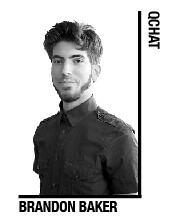 Columnist Brandon Baker compares the GLBT rights movement of the 21st century to the Civil Rights Movement, and asserts that members of the GLBT community should embrace their message.
Columnist Brandon Baker compares the GLBT rights movement of the 21st century to the Civil Rights Movement, and asserts that members of the GLBT community should embrace their message.
Snoozing away and robotically twiddling my thumbs in my Mosaic class – yeah, you know what I’m talking about – an intriguing thought crossed my mind as my professor proceeded with her millionth lecture on W.E.B. DuBois.
Contrary to the beliefs of tea baggers and other uber-conservatives, gay people do have souls.
I recognize that drawing parallels to the Civil Rights Movement has historically encroached on dangerous political territory, but DuBois had a little something special to his argument of seamlessly blending together minority and majority identities.
If the problem of the 20th century was the color line, perhaps it can be said that the problem of the 21st century is the sexual one?
As time has marched on, the problems of the gay rights movement have begun to look more like those of the Civil Rights Movement. We have a contentious court decision approaching on what it means to be married, a growing infrastructure of hierarchical activist organizations and protest marches that fill the streets of the nation’s most populous cities in an effort meant to invade the boob-tube homes of millions as much as it is to invade the channels of Washington.
Our message has dramatically evolved in the past decade as GLBT people as a whole come to realize that our existence relies on the same “double-consciousness” that DuBois wrote about long ago. We exist as a group of people constantly living from the outside looking in, regardless of whether or not we wear our sexuality on our sleeves.
We deal with the glares of onlookers as we hold hands with our significant others, as we raise children and as we don fashionable garments that – to my continuously baffled mind – somehow make us “eccentric” or “metro” rather than simply “stylish.” This poses the ever-lingering minority question of whether a person should identify as a member of the GLBT community or as an American. But really, why should we have to choose?
Though many in the political world take great joy in painting a “them and us” scenario, the image of progress comes from a picture in which these lines are finally blurred, and ultimately erased. The culture of the GLBT community is not so unlike the mainstream culture of America in its inherent values. As a result, it’s almost offensive to see pundits publicly treat the GLBT community as if it is embarrassingly “un-American” or unrepresentative of what it means to be wholesome and properly educated.
The GLBT community may not be able to boast sorrow songs or a geographic culture to point to in its history, but it does have a collective flair to it that persists and strengthens in the modern world. While the African-American community entertained with Harlem minstrels, we entertain with drag-queen divas. While the African-American community has Chris Rock, we have Joan Rivers. And on a perfectly serious note, do I even need to point out the level of GLBT involvement in the arts?
Yes, if the gay rights movement is indeed going to continue chugging along down the pathway toward equality, we are going to have to not only embrace our cultural identity in the same admirable way the African-American community once did, but we are also going to have to take things a step further.
DuBois once advocated for the “Talented Tenth,” an ideal scenario that involved the education of African-Americans in liberal arts in order to lift up the remaining nine-tenths of the community. This same tactic should be looked to and employed by the GLBT movement going forward, only recognizing that emphasis on one segment of a community doesn’t – and shouldn’t – mean the downfall of the rest of a community. The popular “greatest good for the greatest number” phrase instantly comes to mind.
I recall an impactful moment in 2008 during a school board meeting in my Pennsylvania hometown, where a gay man bravely, and largely unprompted, spoke up in defense of a proposed Gay-Straight Alliance, acknowledging his own sexuality and standing behind it in spite of dirty looks and assured long-term backlash. He spoke as an educated man with compassion, with dignity and with his own sense of Americanism. Looking back, I admire the man more than I realized at the time, and his courageousness still strikes me as the leading example of how the GLBT community should treat its role as Americans and people of the world.
To educate ourselves, to “put ourselves out there,” is to educate the world. GLBT persons shouldn’t shun their culture for a better public relations message or water down their arguments for the sake of molding to the mainstream, we should look to our backgrounds as GLBT people and see them for what they really are: indicators of soul.
Brandon Baker can be reached at brandon.baker@temple.edu.



Be the first to comment